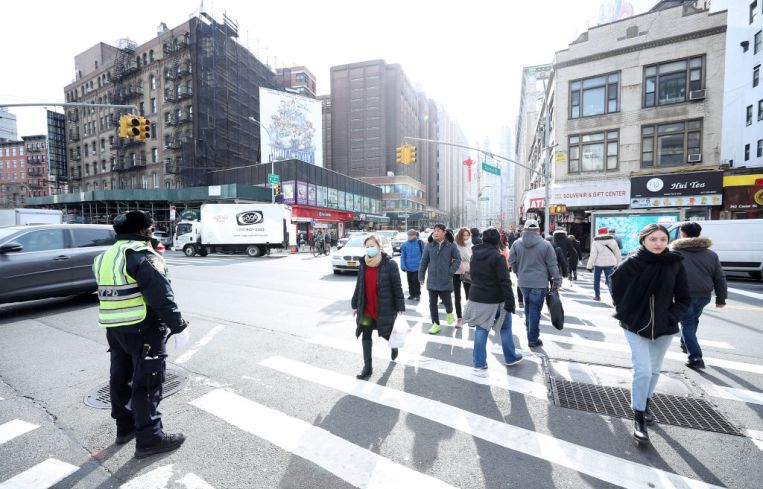NYC Real Estate Braces for Major Disruptions as Coronavirus Circles the Globe
By Rebecca Baird-Remba March 2, 2020 3:04 pm
reprints
While the stock market takes its biggest plunge since 2008 amid coronavirus fears, the real estate and construction worlds are grappling with the prospect of delays and rising costs as Chinese manufacturing and shipping slow to a crawl.
As of last week, China had logged nearly 79,000 coronavirus cases and 2,800 deaths from the virus, leading an outbreak that has expanded to countries including South Korea, Italy and the U.S. The impact in New York City is already being seen on the retail side, where tenants are becoming more cautious about closing deals as tourism from Europe and Asia slows, said JP Sutro, a retail broker at Lee & Associates NYC.
“Since New York is such a heavy tourist destination, if there’s any kind of consideration that tourism will take a hit, it starts to shake their confidence,” Sutro said.
He pointed to a Chinese restaurant chain concerned about its ability to ship restaurant supplies from China to its Times Square location; another Asian restaurant struggling to close its Series A round after its investors in China went dark; and a clothing store struggling to keep inventory, manufactured in China, on its shelves.
But perhaps the biggest threat is to the construction industry, where concerns are mounting around ordering supplies and fixtures from China. Shipments could be significantly delayed, which would derail construction schedules and raise costs for development projects. And some contractors have to consider where else they will order raw materials and supplies if they can’t get them from China, given that most of the other options are more expensive.
“The biggest concern is supply chain issues — steel, millwork, plumbing fixtures, electrical fixtures, concrete boards, flooring tiles, steel,” said Joseph Natarelli, the head of the construction industry practice group at accounting firm Marcum LLP. “It takes about three weeks to get something from China to the U.S., and any delay could stretch it out much more.”
The question on many contractors’ minds is whether or not they are going to be forced to shoulder the costs of pricier materials and delayed shipments. Many construction companies are going back into their contracts to check whether they have what’s called a force majeure clause, which means that contractors are no longer liable for cost overruns in the event of an unavoidable disaster, or what some experts call “an act of God.” Natarelli predicted that the industry will soon experience an uptick in litigation about what defines a force majeure issue, and whether the coronavirus outbreak qualifies.
The best contractors are taking proactive steps to plan for the possibility that they’ll need to buy their materials elsewhere and negotiating potentially higher prices with their clients now, said Natarelli.
The Trump administration has already tried to crack down specifically on imports of Chinese steel, which is significantly cheaper than domestically produced steel. The accountant noted that the construction industry may not experience the impacts of the outbreak and of steel tariffs for a few years, because projects that are already underway often order their supplies years in advance.
And panic may drive up prices, too. Some alarmed contractors are “chasing the market and trying to ensure they buy up materials before everyone else,” Natarelli noted. “The market is starting to get saturated; supply could be an issue.”
Julian Anderson, the president of construction cost surveying company Rider Levett Bucknall, also raised the issue of who will be legally responsible for cost overruns on construction projects across the country.
“Who’s bearing the cost brunt of this?” asked Anderson. “Is it an excusable delay? What did the contractor do to mitigate this? Did they make prior preparation for this? Do insurance policies kick in?”
There’s also the possibility that a major outbreak in the U.S. could mean workers simply don’t want to risk showing up on job sites.
“Initially it may be hard to get people to come back to construction sites, so [contractors] may have to pay a premium to get their people to come back to work,” said Anderson. He added that the government could shut down major construction projects or transportation infrastructure in parts of the U.S. if the outbreak becomes serious enough.
And of course, there are the longer-term financial impacts of a potentially widespread pandemic.
“If this virus continues to upset the financial markets and the economy as a whole, then it’s likely that it will drive a recession which will drive construction costs down, because there’s less work,” Anderson explained. “If the virus outbreak is bad, contractors should be very focused on keeping their cash flow coming through this.”
Chris Smith, a senior director in CBRE’s construction cost consultancy and a member of the Royal Institution of Chartered Surveyors, struck a calmer note about what the industry is seeing at the moment.
“We’re not really experiencing a major negative impact from coronavirus yet,” said Smith. “Most of the raw materials and the products we use in construction are in stock and already in shipment from China. The impact will be over the next few months.”
CBRE and its clients are creating contingency plans to order products from other domestic and foreign sources if their supply chain from China dries up or slows down dramatically. But he cautioned that “it’s too soon to know if [the outbreak] will hang around long enough to have a significant issue on the supply chain.”



